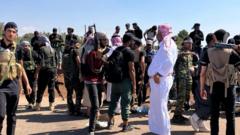Bedouin fighters near the southern Syrian city of Suweida have communicated to the BBC that while they are observing a ceasefire with the local Druze community, they are open to reigniting hostilities. After a week marked by intense sectarian violence involving Druze fighters, Bedouins, and government forces—alongside Israeli airstrikes supporting the Druze—the Bedouins have retreated to surrounding villages.
On Sunday, a UK-based monitoring group reported a "cautious calm" in the region, although it also noted that tribal fighters had carried out attacks on nearby villages. As of that day, smoke continued to rise from Suweida city, particularly noticeable from the Druze town of al-Mazara'a, which has recently come under Syrian government control after being captured by Bedouins.
At a military checkpoint, heavily armed government personnel prevented Bedouins from re-entering Suweida. Among the crowds of Bedouin fighters, there were urgent demands for the release of injured members still held in the city, whom they regard as hostages. One tribal elder asserted to the BBC, "We are committed to the agreement, but if they don't follow it, we will have to return, regardless of the consequences."
The clashes, which began following the abduction of a Druze merchant, have led to significant casualties on both sides. The Syrian Observatory for Human Rights estimates that over 1,120 people have lost their lives, including numerous civilians. Reports of atrocities have emerged, with both Druze and Bedouin fighters accused of violence against each other and with significant involvement from government forces.
The UN migration agency reported that at least 128,000 people have been displaced due to the violence, and medical supplies in Suweida city have become critically low. A humanitarian convoy from the Syrian Red Crescent has reached the city; meanwhile, Israel has reportedly provided medical assistance to Druze families affected by the conflict.
In the village of Mia'rbah, displaced Bedouin refugees gathered around ruins of former classrooms, expressing their fears for the future coexistence between Bedouins and Druze. As one individual put it, the possibility of living peacefully together hinges on the government's ability to enforce order and security. In a disheartening insistence on mistrust, another displaced woman described the Druze as "traitors," emphasizing that peace is impossible in the current climate of insecurity.
Additional contributions to this unfolding story have been made by Jack Burgess, reflecting the dire circumstances facing communities in this war-torn region of Syria.



















